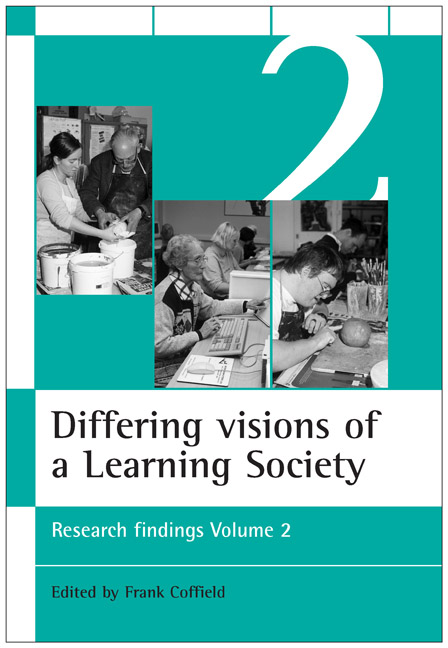Book contents
- Frontmatter
- Contents
- Notes on contributors
- Dedication
- The three stages of lifelong learning: romance, evidence and implementation
- one The meaning of the Learning Society for adults with learning difficulties: bold rhetoric and limited opportunities
- two Networks, norms and trust: explaining patterns of lifelong learning in Scotland and Northern Ireland
- three Learning culture, learning age, learning society: turning aspirations into reality?
- four Teaching and learning in higher education: issues of innovation
- five Participating in the Learning Society: history, place and biography
- six Skills in the British workplace
- Index
- The Learning Society series
three - Learning culture, learning age, learning society: turning aspirations into reality?
Published online by Cambridge University Press: 05 July 2022
- Frontmatter
- Contents
- Notes on contributors
- Dedication
- The three stages of lifelong learning: romance, evidence and implementation
- one The meaning of the Learning Society for adults with learning difficulties: bold rhetoric and limited opportunities
- two Networks, norms and trust: explaining patterns of lifelong learning in Scotland and Northern Ireland
- three Learning culture, learning age, learning society: turning aspirations into reality?
- four Teaching and learning in higher education: issues of innovation
- five Participating in the Learning Society: history, place and biography
- six Skills in the British workplace
- Index
- The Learning Society series
Summary
The concepts of ‘learning society’ and ‘lifelong learning’ appear in a number of guises in the literature and in policy pronouncements (Coffield, 1999). Our project was concerned with policy and practice: the strategies to bring about a learning society in the wider national sense and to develop a learning culture at the level of organisations, groups and individuals. We focused on a particular feature – credit-based learning – and its role in the development of learning cultures at local level.
National policy statements about the Learning Society offer numerous visions of lifelong learning as part of a ‘learning culture’. The government's own vision of lifelong learning is set out in the White Paper, Learning to Succeed:
Lifelong learning can enable people to play a full part in developing their talent, the potential of their family, and the capacity of the community in which they live and work. It can and must nurture a love for learning. This will ensure the means by which our economy can make a successful transition from the industries and services of the past, to the knowledge and information economy of the future. It also contributes to sustaining a civilised and cohesive society, in which people develop as active citizens and in which generational disadvantage can be overcome. (DfEE, 1999, p 1)
The underpinning of such lifelong learning by the development of a ‘learning culture’ is elaborated in the reports of the advisory group under the chairmanship of Bob Fryer (1997, 1999). Such a lifelong learning culture (Fryer, 1997) would be characterised by:
• the absence of a ‘learning divide’ where a minority with qualifications continue to learn throughout their lives and the majority have few or no formal qualifications and do not participate in systematic learning after leaving school;
• a shared responsibility for learning between individuals, employers and the state;
• widened participation and higher levels of achievement – “many more people successfully get to the starting line” (p 5);
• accessible learning: flexible but coherent and coordinated, learner oriented rather than provider oriented;
• an emphasis on home, community and workplace as key places of learning;
• a credit framework where interim achievement is awarded and units of credits can be accumulated into full qualifications according to need;
• a changed language and vocabulary to describe learning (p 13);
• inclusion and social cohesion (p 14);
- Type
- Chapter
- Information
- Differing visions of a Learning Society Vol 2Research Findings, pp. 119 - 142Publisher: Bristol University PressPrint publication year: 2000



